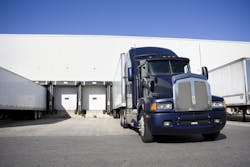It’s estimated that trucks on the road travel empty 30% of the time. Wallace Lau, a senior industry analyst at Frost & Sullivan, believes mobile-based freight brokering, commonly known as Uber for Trucking, can help mitigate 8-15% of those empty miles.
Lau recently authored “Uber for Trucks: Executive Analysis of North American Mobile Based Freight Brokering Market” for the firm. And he believes that the Uber model for trucking is poised to revolutionize freight mobility.
Currently, according to the study, mobile based freight brokerage is a budding market that generates approximately $100 million in revenues. By 2025, the mobile freight market is expected to grow at a compound annual growth rate of 74.65% and generate $26.40 billion in revenue for the entire market, Lau said. And, by 2025, 16% of third party logistics business will be enabled through mobile platforms, the study notes.
“Right now, the market is gaining a lot of traction and a lot of things have to be worked out,” Lau told Fleet Owner. “Everyone is trying to find the right business model.”
“[Uberization] is currently targeted at owner operators and smaller fleets,” Lau added. “It helps promote shipper and carrier transparency, reduces empty miles traveled, and helps automate back office processing by reducing paperwork and putting it all in the app.”
Though smaller for-hire fleets (10 vehicles or less) and owner operators are the key consumer segments targeted by mobile-based freight brokering firms, medium-large sized and private fleets are likely to adopt the solution within the next 10 years, according to the study.
The analysis suggests mobile-based freight brokers are attempting to rise above traditional brokerage firms by offering higher proposed value for all players involved.
For drivers and carriers, that means:
- A user-centric approach towards freight brokerage
- Reduction in empty miles traveled
- Free routing and a freight efficiency tool/solution.
Shippers can:
- Improve on-demand and on-time deliveries
- Access fleets with 24/7 connectivity
- Locate and identify qualified nearby carriers for shipment
The report also suggests that Uberization will improve fleet productivity by fully utilizing trucks and driver resources; improving uptime, communication and fleet efficiency; and providing full fleet transparency from pickup to delivery. Lau added that these solutions reduce tedious paperwork, faxing and phone call processes, and make viewing and receiving invoices and payments a more efficient process.
For the industry as a whole, Lau said Uberization will reduce freight mobility problems at distribution hubs, minimize the industry’s carbon footprint due to improved logistics, and minimize the driver shortage strain on the industry.
“This allows shippers and carriers to connect in transparent ways,” Lau said. “And drivers take on central roles – it’s their decision to take the loads or not. We now have technology that allows the driver to stay relevant and instantly be paid.”
In the end, according to the report, long-term mobile-based freight brokering is expected to emerge “as a fundamental platform that drives optimal asset utilization and enhances efficiency of freight mobility” across the globe. Here’s a look at what that means for key industry segments by 2025:
-
For-hire fleets – The market is expected to reach approximately 16% of the entire freight brokerage market (about $220 billion) and primarily comprise for-hire fleets.
-
Private fleets – Will utilize mobile-based freight brokering networks to help optimize their fleet operations to find extra trucks for their fleets due to seasonal fluctuations or to provide assistance to other carriers when there is un-utilized capacity available. Private fleets will use these solutions to improve their own assets.
-
OEMs – According to the report, in the future, OEMs could use these apps for offering advertisements, service and maintenance reminders/updates, driver infotainment, weather and traffic updates, and other services that can help sell their solutions.
-
Brokers – Freight brokerage is expected to continue to evolve and become a complete solution including transport management systems, telematics, resource management and ship tracking. “The maturing offering of mobile-based freight brokerage is expected to be a driver of growth in the total freight brokerage market as a platform to create and enhance business among carriers and shippers.”
About the Author

Cristina Commendatore
Cristina Commendatore is a past FleetOwner editor-in-chief. She wrote for the publication from 2015 to 2023.
